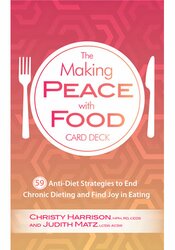How To Reject Diet Culture This Holiday Season
Help clients set boundaries, find support, and make peace with food

Anti-diet experts Christy Harrison, MPH, RD, CEDS, and Judith Matz, LCSW, recently came together to answer questions about body image, anti-diet culture, and disordered eating. As co-authors of The Making Peace with Food Card Deck, they shared their insight on some of clinicians' most-asked questions, including one that many may be asked by their clients in the coming weeks:
Judith: This is a common concern for people who start down the anti-diet path because it’s a real shift in your beliefs and values. So often my clients previously engaged in diet talk at the holidays. It was just the norm. Now they’re realizing how harmful and triggering those conversations are, and they want to do something else.
This is where the family dynamic comes in. Some clients are able to sit down and say, “Hey, I want to share with you what I’m doing. I want to tell you why these conversations no longer serve me.” They can to set a boundary, like agreeing that during dinner everyone will enjoy their food and no one will comment on calories.
Some families are receptive to that, but others aren’t, so instead you might try to change the conversation when weight comes up by saying something like, “Rather than talking about weight, I’d like to tell you about this new relationship I’m in.”
Sometimes people get to the point where they just need to leave the room. If the family dynamic is not serving them in any way, it may be time to get up and use the bathroom or go text a friend for support.
I hope that people can plan ahead and have conversations before they go home. While with family, have self-compassion and know that what you’re doing is right for you. I’ve had clients say as they’ve gotten further into this work that they feel sad for family members who are unable to enjoy the holiday meal. Hold on to your own journey and keep finding support in other places if your family doesn’t provide it.
Christy: Changing the subject and having gentle ways to set boundaries are all important. Something that can also be helpful is having someone going into that situation, like a close sibling or cousin, who you can talk to ahead of time about your history with food. They can be an ally to you in this process so that if diet talk does start to come up, they can help in changing the subject, or at least you can elbow each other, roll your eyes, and have that little bit of solidarity.
If you’re going to have any sort of longer conversation, it can be helpful to stay focused on “I” statements, like “In my experience, dieting has been really harmful” or “I’m working to heal from disordered eating and it’s not helpful to have these kinds of conversations about weight.”
Rather than debating people on the science of dieting and weight loss, I often say it’s almost like talking to people about politics or religion. It’s very personal and deep and has so many culturally conditioned roots. Instead of getting into debates, focus on how you feel and what’s worked for you.
When I see my family at the holidays, there’ll be a lot of triggering conversations about weight. What should I do?
Judith: This is a common concern for people who start down the anti-diet path because it’s a real shift in your beliefs and values. So often my clients previously engaged in diet talk at the holidays. It was just the norm. Now they’re realizing how harmful and triggering those conversations are, and they want to do something else.
This is where the family dynamic comes in. Some clients are able to sit down and say, “Hey, I want to share with you what I’m doing. I want to tell you why these conversations no longer serve me.” They can to set a boundary, like agreeing that during dinner everyone will enjoy their food and no one will comment on calories.
Some families are receptive to that, but others aren’t, so instead you might try to change the conversation when weight comes up by saying something like, “Rather than talking about weight, I’d like to tell you about this new relationship I’m in.”
Sometimes people get to the point where they just need to leave the room. If the family dynamic is not serving them in any way, it may be time to get up and use the bathroom or go text a friend for support.
I hope that people can plan ahead and have conversations before they go home. While with family, have self-compassion and know that what you’re doing is right for you. I’ve had clients say as they’ve gotten further into this work that they feel sad for family members who are unable to enjoy the holiday meal. Hold on to your own journey and keep finding support in other places if your family doesn’t provide it.
Christy: Changing the subject and having gentle ways to set boundaries are all important. Something that can also be helpful is having someone going into that situation, like a close sibling or cousin, who you can talk to ahead of time about your history with food. They can be an ally to you in this process so that if diet talk does start to come up, they can help in changing the subject, or at least you can elbow each other, roll your eyes, and have that little bit of solidarity.
If you’re going to have any sort of longer conversation, it can be helpful to stay focused on “I” statements, like “In my experience, dieting has been really harmful” or “I’m working to heal from disordered eating and it’s not helpful to have these kinds of conversations about weight.”
Rather than debating people on the science of dieting and weight loss, I often say it’s almost like talking to people about politics or religion. It’s very personal and deep and has so many culturally conditioned roots. Instead of getting into debates, focus on how you feel and what’s worked for you.
Help Clients Reclaim Joy in Eating

End chronic dieting and heal your relationship with food! In this unique and easy-to-use card deck, you’ll find 59 anti-diet strategies to help you break free from the diet mindset and find peace with food. Learn how to:
- Reject diet culture
- Honor your hunger cues
- Practice attuned eating
- Find self-compassion
- Nourish your body
- Navigate emotional eating
Meet the Experts:
Christy Harrison, MPH, RD, CEDS, is an anti-diet registered dietitian nutritionist, certified intuitive eating counselor, certified eating disorders specialist, and journalist. She's the author of Anti-Diet: Reclaim Your Time, Money, Well-Being, and Happiness Through Intuitive Eating and the forthcoming 2023 release, Rethinking Wellness. Christy is the host of the podcast Food Psych, with tens of thousands of listeners worldwide.
Learn more about their educational products, including upcoming live seminars, by clicking here.
Judith Matz, LCSW, is co-author of the Body Positivity Card Deck and two books on the topics of eating and weight struggles. Beyond a Shadow of a Diet: The Comprehensive Guide to Treating Binge Eating Disorder, Compulsive Eating and Emotional Overeating has been called “the new bible” on this topic for professionals. The Diet Survivor’s Handbook: 60 Lessons in Eating, Acceptance and Self-Care was a #1 bestseller on Amazon and is a favorite resource for therapists to use with clients. She is also the author of Amanda’s Big Dream, a children’s book that helps kids to pursue their dreams – at any size!
Judith has a private practice in Skokie, IL, where she focuses her work with clients who want to get off the diet/binge rollercoaster and learn to feel at home in their bodies. Through her individual counseling, groups, workshops, presentations and books, Judith has helped thousands of people to develop self-care skills that increase physical, emotional and spiritual wellbeing without a focus on the pursuit of weight loss. Through educational programs, she is dedicated to helping people end the preoccupation with food and weight.
Judith is a frequent contributor to the Psychotherapy Networker magazine and a popular speaker at national conferences. Descriptions of her work have appeared in the media including the New York Times, LA Times, Allure, Fitness, Self, Shape, Today’s Dietitian, Diabetes Self-Management, NBC News Chicago, Huffington Post Live, and she appears in the documentary America The Beautiful 2.
Learn more about their educational products, including upcoming live seminars, by clicking here.
Learn more about their educational products, including upcoming live seminars, by clicking here.
Judith Matz, LCSW, is co-author of the Body Positivity Card Deck and two books on the topics of eating and weight struggles. Beyond a Shadow of a Diet: The Comprehensive Guide to Treating Binge Eating Disorder, Compulsive Eating and Emotional Overeating has been called “the new bible” on this topic for professionals. The Diet Survivor’s Handbook: 60 Lessons in Eating, Acceptance and Self-Care was a #1 bestseller on Amazon and is a favorite resource for therapists to use with clients. She is also the author of Amanda’s Big Dream, a children’s book that helps kids to pursue their dreams – at any size!
Judith has a private practice in Skokie, IL, where she focuses her work with clients who want to get off the diet/binge rollercoaster and learn to feel at home in their bodies. Through her individual counseling, groups, workshops, presentations and books, Judith has helped thousands of people to develop self-care skills that increase physical, emotional and spiritual wellbeing without a focus on the pursuit of weight loss. Through educational programs, she is dedicated to helping people end the preoccupation with food and weight.
Judith is a frequent contributor to the Psychotherapy Networker magazine and a popular speaker at national conferences. Descriptions of her work have appeared in the media including the New York Times, LA Times, Allure, Fitness, Self, Shape, Today’s Dietitian, Diabetes Self-Management, NBC News Chicago, Huffington Post Live, and she appears in the documentary America The Beautiful 2.
Learn more about their educational products, including upcoming live seminars, by clicking here.



